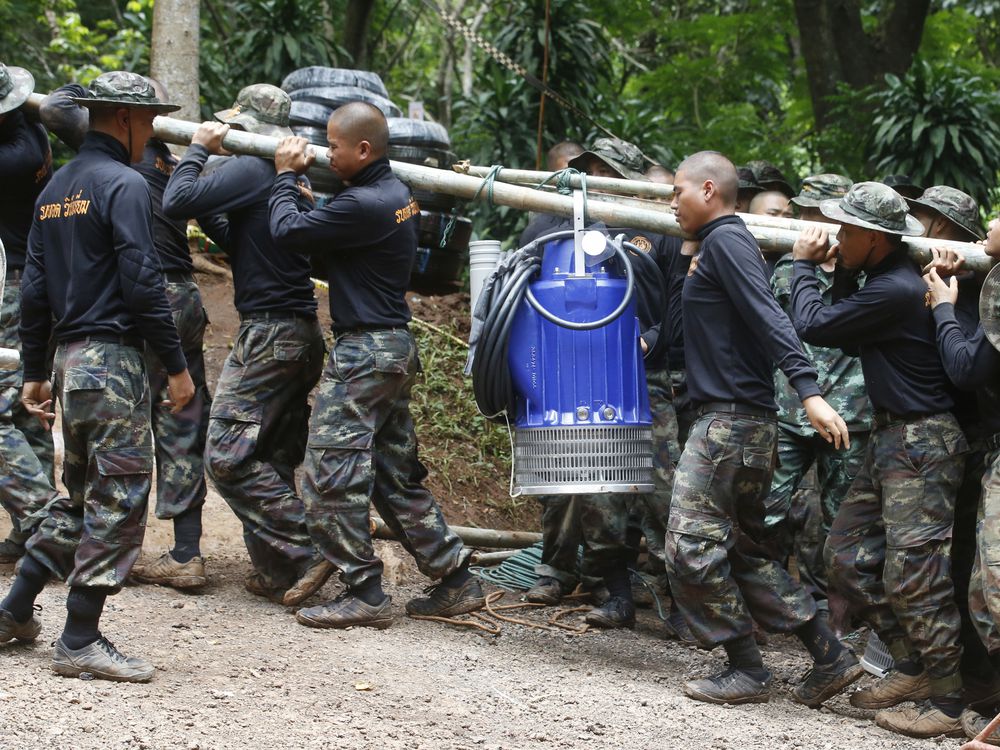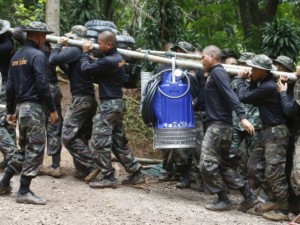

MAE SAI, Thailand: The soccer coach trapped in a cave with 12 Thai boys apologized to their parents in the first letter he and the team have sent out through divers, in which the boys say they’re doing well and missing their families.
Rescuers said they won’t immediately attempt an underwater evacuation because the boys have not yet learned adequate diving skills. But if heavy rains start again, divers will try to take the boys out right away, Chiang Rai Gov.
Narongsak Osatanakorn said at a midnight news conference on Friday. The same day saw a disheartening setback with the death of a former Thai navy SEAL diving in flooded passageways to deliver oxygen supplies.
“To the parents of all the kids, right now the kids are all fine, the crew are taking good care. I promise I will care for the kids as best as possible. I want to say thanks for all the support and I want to apologize to the parents,” wrote 25-year-old Ekapol Chanthawong, the coach of the Wild Boars soccer team.
One boy writes: “I’m doing fine, but the air is a little cold but don’t worry.
Although, don’t forget to set up my birthday party.” Another, identified as Tun, writes: “Mom and Dad, please don’t worry, I am fine. I’ve told Yod to get ready to take me out for fried chicken. With love.” The name reference could be of a waiting relative.
The rest of the scribbled letters on pages from a notebook struck a similar message of love for parents and telling them not to worry.
One boy named Mick wrote: “Don’t be worried, I miss everyone. Grandpa, uncle, mom dad, and siblings I love you all. I’m happy being here inside, the navy SEALS have taken good care. Love you all.” The boys, 11 to 16, and their coach went exploring in the cave after a soccer game June 23. Monsoon flooding cut off their escape and prevented rescuers from finding them for almost 10 days.
The only way to reach them was by navigating dark and tight passageways filled with muddy water and strong currents and in oxygen-depleted air.
Asked at his news conference about bringing the boys out underwater, the governor replied, “Not today because they cannot dive at this time.” Narongsak said the boys were still healthy and have practiced wearing diving masks and breathing in preparation for the diving possibility.
Thai officials had been suggesting in public statements that a quick underwater evacuation of the boys and their coach was needed because of the possibility that access to the cave could soon close again due to seasonal monsoon rains expected this weekend.
Earlier efforts to pump out water from the cave have been set back every time there has been a heavy rain.
Cave rescue specialists have cautioned against that approach except as a last resort, because of the dangers posed by inexperienced people using diving gear. The path out is considered especially complicated because of twists and turns in narrow flooded passages.
The suggestion that the trapped team might have to wait months inside until a safe way out is available as was the case in 2010 with Chilean miners trapped underground has met with little enthusiasm.
Authorities continue to pursue a third option, which is finding a shaft or drilling into the mountain in which the cave is located to find a sort of back door entrance.
The death of the Thai diver, Saman Gunan, underscored the risks of making the underwater journey. The diver, the first fatality of the rescue effort, was working in a volunteer capacity and died on a mission to place oxygen canisters along the route to where the boys and others are sheltered, Thai SEAL commander Rear Adm. Arpakorn Yookongkaew said.
The strategically placed canisters allow divers to stay underwater longer during the five-hour trip to reach the stranded team.
Elon Musk, the entrepreneur behind the Tesla automobile and the SpaceX rocket company, said he would send engineers to help. One of his enterprises is Boring Co., which digs tunnels for advanced transport systems and has advanced ground-penetrating radar.
Musk also brainstormed on Twitter about possible technology for a safe evacuation, suggesting that an air tunnel constructed with soft tubing like a Bouncy Castle could provide flexible passage out. AP






